|
|
|
Sort Order |
|
|
|
Items / Page
|
|
|
|
|
|
|
| Srl | Item |
| 1 |
ID:
127769
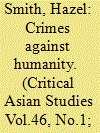

|
|
|
|
|
| Publication |
2014.
|
| Summary/Abstract |
The United Nations Human Rights Council (UNHRC) Commission of Inquiry, established in 2013 to investigate human rights violations in North Korea, identified food rights violations, among other abuses, as potentially constituting crimes against humanity. A contradiction arises in that UNHRC claims of food rights violations in the DPRK are not congruent with the statistical indicators emanating from the UN humanitarian and development agencies that have worked in the DPRK since the mid 1990s and that have engaged in and published substantial research on food, nutrition, and health. The author of this article contends that North Korea has an oppressive government and argues that the lack of transparency makes the many things that are unknown about North Korea, especially its opaque penal system, of legitimate ethical and political concern. Reasonably good data on issues pertaining to social and economic rights do exist, however, as this article shows. The inconsistency between the received wisdom on food and nutrition is of concern because the potential consequences of a state being judged as committing crimes against humanity include military intervention and consequent threats to life for millions. This article reconsiders how and why the received wisdom becomes unchallenged and unchallengeable in scholarly, policy, and media discourse. Inconsistency and misrepresentation is not primarily due to conscious bias but much more because of the unconscious adoption of a securitized perspective through which knowledge about North Korea is filtered. The article argues for reframing North Korean human rights issues on the basis that North Korean society is neither unique nor unknowable.
|
|
|
|
|
|
|
|
|
|
|
|
|
|
|
|
| 2 |
ID:
127761


|
|
|
|
|
| Publication |
2014.
|
| Summary/Abstract |
All too often narrowly focused on the issue of perceived North Korean abuses, human rights on the Korean peninsula should rather be understood against the militarized legacies of national division, a history in which the United States has played no small role. Rather than isolate one or the other of the two Koreas for censure, this article identifies the hostile mutual interdependence of North Korea and South Korea as a starting-point for understanding human rights in both north and south. Arguing for a comprehensive human rights approach, this analysis demonstrates that the military expenses and militarized tensions on either side of the DMZ as well as the conscription of South Korea to the neo-cold war agenda of the United States within the Asia-Pacific region infringes on the Korean peoples' right to peace. Positing "Korean human rights" as an alternative framework that aims at once to abolish militarism and to improve human rights through peaceful, cooperative, and constructive means, this article contends that any genuine solution to human rights issues on the peninsula entails more than a unidirectional critique. Durable solutions require critical self-reflection and collaboration on the part of both Koreas.
|
|
|
|
|
|
|
|
|
|
|
|
|
|
|
|
| 3 |
ID:
127768
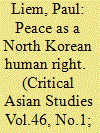

|
|
|
|
|
| Publication |
2014.
|
| Summary/Abstract |
This essay analyzes the "human rights" framework that evolved, paradoxically, as a way to address human rights and human security needs in the Democratic People's Republic of Korea (North Korea) by withholding humanitarian assistance from that country. This framework turns on the premise that the North Korean "regime" is the source of the society's ills, that it is unwilling to implement radical reforms needed to restore its economy for fear that they would undermine its rule, and that it maintains its grip upon society by means of propaganda and repression. Regime collapse, some argue, will thus lead to a better life for the North Korean people. Informed by this view, in combination with "intelligence" sources that predict the imminent collapse of the "regime," U.S. policy has been loath to provide any assistance, including food aid, that might prolong the life of the state. By viewing North Korean society today in the context of its historical experience before and since the decline of its economy starting in the early 1990s, this essay challenges assumptions that underlie the "human rights" argument for regime collapse. It explores alternative reasons for the society's unexpected survival and argues that analysis of North Korean society in abstraction from the state of war in which it is situated, fails to offer realistic options for addressing the human security of the North Korean people.
|
|
|
|
|
|
|
|
|
|
|
|
|
|
|
|
| 4 |
ID:
127765


|
|
|
|
|
| Publication |
2014.
|
| Summary/Abstract |
This article describes and analyzes two approaches in South Korean civil society to the issue of human rights in North Korea: a civil and political rights-based approach and an economic, social, and cultural rights-based approach that emphasizes the right to food. By analyzing the relationship between the policy stances of South Korean administrations in respect of North Korean human rights (NKHR) and NGO (nongovernmental organization) advocacy, this essay argues that South Korean humanitarian and human rights NGOs contributed to the adoption of different human rights norms in South Korean society. Since 2000, South Korean humanitarian NGOs separated civil and political rights (CPR) concerns from economic, social, and cultural rights (ESCR) concerns and selectively adopted the latter by limiting these human rights to the "right to food." Under the hard-line policy of the Lee Myung-Bak administration (2008-2012), South Korean human rights NGOs resumed active advocacy targeting the international community by exposing poor CPR situation in North Korea through transnational human rights networks given the CPR approach and this led to the dominance of the CPR approach in South Korean civil society. Thus, humanitarian and human rights NGOs in South Korea narrowed the focus of human rights norms to CPR and this emphasis influenced and shaped the way later political administrations in South Korea viewed human rights issues related to North Korea.
|
|
|
|
|
|
|
|
|
|
|
|
|
|
|
|
| 5 |
ID:
127762
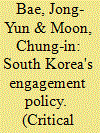

|
|
|
|
|
| Publication |
2014.
|
| Summary/Abstract |
During the progressive decade of the Kim Dae-jung and Roh Moo-hyun governments (1998-2007), South Korea actively pursued an engagement policy with North Korea that aimed to facilitate de facto unification by means of exchanges and cooperation, trust-building, and peaceful coexistence. But the engagement policy has been subject to harsh criticism for its silence over human rights conditions in North Korea. This article looks into the nature of conservative critiques of the engagement policy on the human rights front and elucidates how its proponents have responded. Attention is given to how the trade-off between peace and human rights, as well as that between basic human needs and human rights, constrained their open pursuit of a human rights campaign against North Korea. Also examined is their belief that democracy and human rights should not be imposed from the outside and that North Koreans should win them through struggle from within. For conservatives, hard-line pressures are of limited utility, and opening and reform, the introduction of market system, the expansion of civil society, and the advent of the middle class through the engagement policy are the best ways, albeit time consuming, to enhance human rights and democracy in the North. Finally, the authors critically assess recent debates on the North Korean Human Rights Act in the South Korea's National Assembly as a way of exploring the limits and promise of the engagement policy.
|
|
|
|
|
|
|
|
|
|
|
|
|
|
|
|
| 6 |
ID:
127767
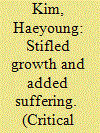

|
|
|
|
|
| Publication |
2014.
|
| Summary/Abstract |
The United States rhetorically promotes a nuclear-free North Korea with an open economic system, eager for the country to become an integrated member of the global community. Sanctions Washington has imposed on Pyongyang since the outbreak of the Korean War, however, have failed to advance this objective. Indeed, sanctions have proven to be counterproductive. While having a negligible effect on North Korea's nuclear and missile programs, sanctions also restrict the inflow of foreign investment, thereby stymieing North Korea's efforts to recalibrate its economic system. The dearth of foreign investment further limits the establishment of market-based exchanges that would facilitate economic liberalization, a process that could improve economic security in North Korea. It is the North Korean people, moreover, not the governing elite, who bear the ultimate costs and suffer under these sanctions, creating undeniable tension when considering the causal relationship between economic sanctions and human rights. Despite assurances offered by U.S. administrations that sanctions policies exclusively target the government, this article argues that economic restrictions play a significant role in the country's economic woes, inhibiting Pyongyang from improving the standard of living for the North Korean people and failing to promote an improvement in basic economic rights.
|
|
|
|
|
|
|
|
|
|
|
|
|
|
|
|
| 7 |
ID:
127763
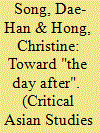

|
|
|
|
|
| Publication |
2014.
|
| Summary/Abstract |
Since 1998, the National Endowment for Democracy (NED), a quasi-private, grant-making organization funded almost entirely by the U.S. Congress via the U.S. State Department, has been, directly or indirectly through its four core institutes, supporting right-wing, neoconservative South Korean human rights and defector groups. In addition to technical assistance, this support has included $6.7 to $11.9 million from 1999 to 2010, with an additional $3 million starting January 2009 directly disbursed to many of these groups by the State Department under then newly elected Barack Obama. This article contends that NED's "human rights" work is part of a much larger strategy of destabilizing the North Korean government in line with U.S. interventionist aims against its foes. By funding international conferences and defector critiques of North Korea (including strategic testimony provided before Congress in the push for passage of the North Korean Human Rights Act of 2004), NED has fostered a North Korean human rights knowledge economy that has substantially shaped public images and opinion about North Korea in South Korea, the United States, and around the world. At the same time, NED's radio broadcasting, propaganda leaflet drops, and other incursionary media have sought to sow discord in North Korea.
|
|
|
|
|
|
|
|
|
|
|
|
|
|
|
|
|
|
|
|
|